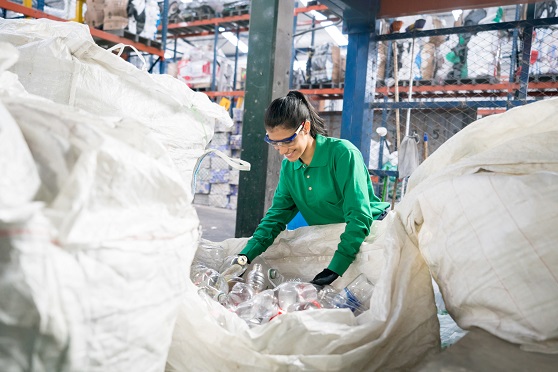
Brought to you by Canadian Standards Association
Plastics Recycling: Why we need a national definition
September 30, 2023 in In-Depth
By Priya Patel, Program Manager, Environment and Climate Change Standards, CSA Group
 Woman working in a recycling factory sorting some bottles and looking very happy - environmental concepts
Woman working in a recycling factory sorting some bottles and looking very happy - environmental concepts The statistics on waste in Canada are startling. According to a study by Environment and Climate Change Canada¹, only 9% of plastic waste generated by various sectors is recycled. The remaining waste is dumped in landfills (86%), incinerated (4%), or leaked into the environment (1%). In the process, $7.8 billion, based on the value of raw materials in 2016, is getting lost.
This “take-make-waste” model, relying on resource extraction and processing and discarding products as waste after moderate use, is contributing to environmental degradation, pollution, and biodiversity loss. Adopting circular economy principles that promote the reuse and recycling of materials in a closed and sustainable loop can help reduce waste and preserve energy, resources, and materials embodied in the products.
Barriers to adopting circularity of plastics
While reduction of the amount of plastic waste through recycling is not a new topic, the efficiency of these efforts is hindered by several factors. Plastics come in various types and compositions, often with different recycling methods and requirements. That can make sorting and processing of plastic waste challenging and expensive, especially when plastics recycling streams get contaminated with non-recyclable items. Availability and type of recycling infrastructure is another challenge, as well as a limited market for recycled plastic materials.
Canada has started taking steps to address plastic waste through regulations; however, there are still gaps that can impede the creation of a cohesive and effective national recycling strategy. In fact, there is little clarity on what recycling and recyclability really mean in the context of the plastics value chain, as there is no commonly accepted definition in use. Existing definitions refer to various activities that make up the recycling value chain – from collection, transportation, handling, and storing to dismantling, sorting, separating, shredding, processing, or remanufacturing. It is not clear, though, at which step a product can be considered recycled and what are the measurable – and comparable – outcomes of the process. Recycling processes and systems also differ from province to province, which further complicates supply chains for national market players.
Benefits of defining recycling
The benefits of establishing common definitions and frameworks for recycling of plastics are significant. Without a clear definition for recycling of plastics, policymakers, manufacturers, recyclers, and other stakeholders end up using different terminology and adhere to different processes and guidelines. That can lead to confusion as materials intended for recycling often move between jurisdictions.
Also, as regulators and governments establish recycling targets and policies to reduce plastic waste, measuring and reporting recycling rates and activities cannot be accurate without a standardized definition of recycling, including clarity on what material is considered to be recycled.
Standardized definitions will allow various stakeholders from across the supply chain to consistently measure, track, and monitor the circularity of plastics, from plastic waste collection to reuse of plastics in manufacturing new products. Data obtained through this process will make it possible to identify the gaps between our data reality and the data potential and support the development of global baseline measurements. Ultimately, consistent and transparent data can drive sound decision-making in product manufacturing and packaging and help the resource recovery and waste management sector determine collection, sorting, and supply chain design.
From research to a new standard
CSA Group, a leader in standards development, research, education, and advocacy in Canada and on the international scene, started exploring the potential for standards to help establish a circular economy for plastics in 2020.
CSA Group research reviewed the current standardization landscape and engaged industry stakeholders and experts, environmental organizations, recycling advocates, governments, and academics to gain insights on barriers, challenges, and opportunities for improving Canada’s low plastic recycling rates. This work confirmed the lack of consensus on definitions for recycling as one of the barriers to moving from the linear “take-make-waste” model towards a circular economy for all materials and products in Canada.
Leveraging this research, CSA Group has established a new national Technical Committee (TC) for Circular Plastic Waste Management, bringing together a balanced group of volunteer experts representing various stakeholder groups from the plastic value chain. In 2023, this TC started working on a new national standard for setting a common plastics recycling definition.
The standard in development, CSA R117, Plastics recycling: Definitions, reporting, and measuring, aims to provide a shared sense of certainty as organizations report on their activities toward reaching Canada’s net zero plastic waste goals. The standard can also facilitate international and interprovincial trade by helping ensure that all stakeholders adhere to the same procedures, processes, and product specifications, using the determined definitions as a baseline for communication. The publication of the new standard CSA R117 is anticipated in late 2024.
CSA Group also explores opportunities for binational standards to harmonize requirements and guidance across Canada and the United States. Harmonization can further help remove barriers to cross-border value chains or when sourcing recycled or reused materials. Through the involvement in standards development activities of the International Standards Organization (ISO), CSA Group members also provide input to the ISO process and bring insights from the international forum to harmonize standards globally.
Find out more about CSA Group standards and research supporting circularity through value retention and waste reduction strategies.
[857 words]
Footnote:
¹ Economic Study of Canadian Plastic Industry, Markets, and Waste, Environment and Climate Change Canada, 2019
CSA Group always strives to provide up-to-date and accurate information. However, no representation or warranty, expressed or implied, is made that this information meets your specific needs, and any reliance on this information is at your own risk. Please contact CSA Group for more information about our services.
© 2023 Canadian Standards Association. All Rights Reserved.